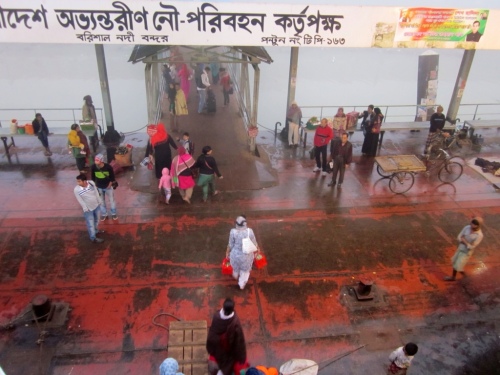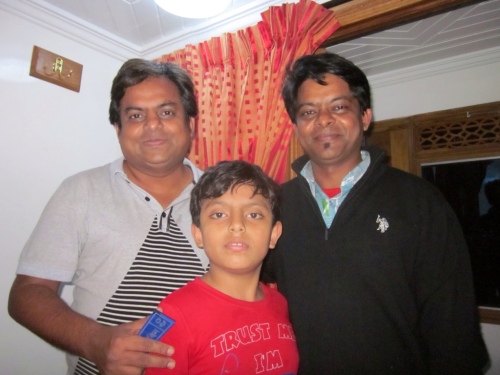Launch, similar to ours
Over the next
couple of days we visited various members of Mahmud and his wife Ruma’s
family in Barisal, Bamrail, and the surrounding area. We also visited a
local orphanage that Mahmud is involved with. It must be mentioned that
the food that we had was delicious. I could hardly move afterwards.
Bamrail is a small village north of Barisal, where Mahmud has some
family. This was my first taste of what Mahmud calls ‘the real
Bangladesh’. It is stunning.
Lunch at the Orphanage
Kids at the Orphanage
The first two days I that spent with Mahmud and his family were a great introduction to Bangladesh. I’m really fascinated with the local transport in Asia for some reason, and by the end of these 2 days we’d caught a taxi, a launch, cycle rickshaw, a battery rickshaw, a cycle van, a moto-van, a motorbike, the local bus, and a small wooden motorboat across the river in Barisal! We ate a lot of great food, and saw some incredibly beautiful scenery. We went to a small village, where we met people who had never even seen a foreigner before, but still spoke some english, which was incredibly humbling. Hopefully I made a good impression. When Bangladesh makes it into the news and into world consciousness, it’s generally for all the wrong reasons. Most of the information in the media generally deals with floods, poverty, ferry crashes, factory fires, political unrest and corruption. But Bangladesh has so much more to offer. Some of the friendliest people that I have ever met, great food, culture shock, beautiful scenery, extensive and frequent public transport, incredible value for money, a sometimes overwhelming mass of humanity, and a genuine adventure. At times it felt like I had the whole place to myself. I saw maybe 20 other westerners in 41 days, 5 of whom were on the Sunderbans tour. Despite this, I never really felt lonely. Bangladeshis are so welcoming and friendly, and there was normally somebody around who spoke enough English to have a conversation. Just before new years in Bandarban, I did meet two awesome girls, Cousin Elina and Cousin Sari from Finland and Sweden, and we travelled together for the next couple of weeks. In Bangladesh, a man wouldn’t normally travel with two women whom he’d just met, so when people asked, we were cousins.

Cousin Joel, Cousin Elina, Cousin Sari
I had no problems finding accommodation or food, and it was really easy to travel around. There’s not really any tourist infrastructure geared towards westerners, but there are heaps of Bengali domestic tourists, and people travelling for business, so there are plenty of hotels in most places. I never booked in advance, and I was only ever turned away from one hotel, in Cox’s Bazar, that was full. They found us another hotel so it was no problem.
The transport was frequent and cheap, if sometimes uncomfortable. I’d just say where I wanted to go, and I’d soon have a team of people making sure that I was going to the right place, that I was safe, that I’d had cha (tea in Bangladesh is ‘cha’, not ‘chai’ like India) and that I was happy. Invariably, somebody would give me their number and make me promise to call them when i arrived safely at my hotel. One guy, Tajul, that I met on the train from Sylhet to Dhaka, even came with me to make sure that I found my hotel ok, and refused to let me pay for the CNG. Typical Bangladesh! Bangladeshis have to be the friendliest bunch of people that I’ve ever had the pleasure of meeting.

Bangladesh
definitely has its problems. Like most of Asia, it is very corrupt.
Every so often you see elephants on the street. Apparently people
driving nearby have to pay a small bribe, otherwise the elephant will
smash their car up! It is also a very poor country. Many jobs that
normally require tools are done by hand too. I caught a rowboat across
the Sadarghat in Dhaka, to where rowboats are built on the opposite
side. There was a man tarring a boat by hand, with his hand.

They reuse everything. When a building is demolished, they chip the concrete off those long metal rods (I don’t know the name) and reuse them, and I frequently saw people chipping mortar off bricks to reuse them as well. I saw lots of people with deformities and health problems that wouldn’t have even been an issue in New Zealand, as they would have been operated on in childhood. You do see a lot of children working too. I didn’t see any kids doing hard labour, but a lot of children work in restaurants, and sometimes the rickshaw drivers are really young. I had to leave my existing ideas on many things at the door, and enter with an open mind.
Bangladesh is a young country, and considering the problems that they have had to face, they are doing their best, and doing really well. It’s pretty inspiring. Bangladesh has the fastest growing economy in South Asia. They are working to get rid of plastic bags; when you buy food and fruit it often comes in bags made of newspaper. They often have newspaper napkins at restaurants, and sometimes food is served on pieces of old english textbooks.
Bangladeshis really value education, and will often ask what your academic qualification is. I met plenty of Bangladeshis who were effectively fluent in English, despite having hardly met any foreigners before. It was very humbling. They also produce all of their own food. Fresh fruit and vegetables are everywhere. Bangladesh, partly due to frequent flooding, has extremely fertile land, and they are extremely good farmers. You can find imported foodstuffs, but they are normally luxury foods rather than necessities, such as coffee, milk powder, coke, and Cadbury chocolate. I didn’t see a Starbucks, McDonalds or a 711.
I found the Bangladeshis to be an extremely happy, inquisitive and friendly people. They are passionate about their country and they have a real lust for life. I was constantly asked ‘have you been to Cox’s Bazar?’. Cox’s Bazar is the longest natural sea beach in the world. It’s not particularly idyllic, although the beach itself is nice, but it’s lauded throughout the land as some sort of utopian paradise, and they love it and get amongst it with great enthusiasm. Every evening thousands of Bangladeshis go down to the beach to party and generally have a great time.
Typical Bangladesh. Work with what you have. Round up your family, friends, cattle, some chickens, turn the music on your cellphone up loud and party like you made it up.
It is also worth mentioning that at no point did i feel any hostility from anyone, or feel unsafe amongst the people. Whilst i’m not in any way a religious man myself, it was easier to say that I was Christian when anybody asked, as they don’t really understand why you wouldn’t have faith, and the language barrier is often too big to cross. I’m told (haven’t read it) that Christians are mentioned in the Quran as being ‘people of the book’ that should be treated with love and respect, and apparently if you encounter any hostility in a Muslim country you can say this. The muslim greeting ‘asalaamu alaikum’ translates as ‘may god give you peace’, and the response ‘alaikum asalaam’ means ‘may god give you peace too’. I think that’s beautiful.

I went to some amazing places, ate some great food, met some of the
world’s friendliest and most hospitable people, and had a real
adventure. It felt like travelling for the first time again. I was
intending on 2 or 3 weeks, but I ended up up staying for 41 days. If
Mahmud hadn’t been so reassuring, and so generous with his time and
forthcoming with his advice, I probably wouldn’t have gone to
Bangladesh. Which would have been a huge mistake, as this has been one
of my favourite travel experiences ever. A great big thank you to Mahmud
Hasan Khan, you are a great man and a fantastic ambassador for your
country. And thank you to all the beautiful people of Bangladesh!
P.S. If you’re interested in hearing and seeing more, I’ll be posting some more photos and details about the people of Bangladesh, the transport, food and the specific places that I visited. Also Thailand and Burma too. I took heaps of photos in Bangladesh. Here are some of my favourites.
Source: https://joeliscurious.wordpress.com/tag/joel-vinsen/
|





















কোন মন্তব্য নেই:
একটি মন্তব্য পোস্ট করুন